The Uni High Library and Spectrum Club have collaborated to hold a series of dialogue sessions centered around the topics of abortion and reproductive rights. Given SCOTUS’ June 2022 decision in Dobbs v. Jackson Women’s Health Organization that effectively overturned 1973’s Roe v. Wade decision and with the fate of reproductive rights heavily debated in the public sphere in the lead up to the November 2022 General Election, the library and Spectrum Club wanted to bring students together to voice their thoughts and feelings on the matter. Our first session was held on Friday, November 11th, and we have two more dialogue sessions planned for Friday, November 18th and Friday, December 2nd. Please feel free to join us in the library during lunch on those days to share your thoughts!
Want some reading material to help you wrap your mind around the topic? We have a mini display set-up in the library showcasing some of the books in the Uni High Library collection that deals with reproductive rights. All of the books listed below live in the Uni High Library and the call numbers are noted!
Non-fiction
Divided We Stand: The Battle Over Women’s Rights and Family Values that Polarized American Politics by Marjorie Julian Spruill
Call Number: 305.40973 Sp88d
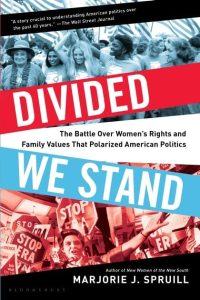
Gloria Steinem was quoted in 2015 (in the New Yorker) as saying the National Women’s Conference in 1977 “may take the prize as the most important event nobody knows about.” After the United Nations established International Women’s Year (IWY) in 1975, Congress mandated and funded state conferences to elect delegates to attend the National Women’s Conference in Houston in 1977, where Bella Abzug, Gloria Steinem, and other feminists endorsed a platform supporting abortion rights, the Equal Rights Amendment, and gay rights. Across town, Phyllis Schlafly, Lottie Beth Hobbs, and the conservative women’s movement held a massive rally to protest federally funded feminism and launch a pro-family movement. Divided We Stand explores the role social issues have played in politics by reprising the battle between feminists and their conservative challengers, leading to Democrats supporting women’s rights and Republicans casting themselves as the party of family values. As the 2016 presidential election made clear, the women’s rights movement and the conservative women’s movement have irrevocably affected the course of modern American politics. We cannot fully understand the present without appreciating the pivotal events that transpired in Houston and immediately thereafter
Sex and the Constitution: Sex, Religion, and Law from America’s Origins to the Twenty-First Century by Geoffrey R. Stone
Call Number: 345.7302 St715s
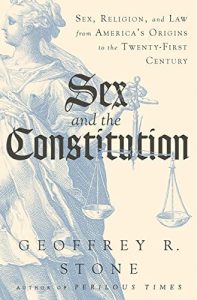
Beginning his volume in the ancient and medieval worlds, Geoffrey R. Stone demonstrates how the Founding Fathers, deeply influenced by their philosophical forebears, saw traditional Christianity as an impediment to the pursuit of happiness and to the quest for human progress. Acutely aware of the need to separate politics from the divisive forces of religion, the Founding Fathers crafted a constitution that expressed the fundamental values of the Enlightenment.
Although the Second Great Awakening later came to define America through the lens of evangelical Christianity, nineteenth-century Americans continued to view sex as a matter of private concern, so much so that sexual expression and information about contraception circulated freely, abortions before “quickening” remained legal, and prosecutions for sodomy were almost nonexistent.
The late nineteenth and early twentieth centuries reversed such tolerance, however, as charismatic spiritual leaders and barnstorming politicians rejected the values of our nation’s founders. Spurred on by Anthony Comstock, America’s most feared enforcer of morality, new laws were enacted banning pornography, contraception, and abortion, with Comstock proposing that the word “unclean” be branded on the foreheads of homosexuals. Women increasingly lost control of their bodies, and birth control advocates, like Margaret Sanger, were imprisoned for advocating their beliefs. In this new world, abortions were for the first time relegated to dank and dangerous back rooms.
The twentieth century gradually saw the emergence of bitter divisions over issues of sexual “morality” and sexual freedom. Fiercely determined organizations and individuals on both the right and the left wrestled in the domains of politics, religion, public opinion, and the courts to win over the soul of the nation. With its stirring portrayals of Supreme Court justices, Sex and the Constitution reads like a dramatic gazette of the critical cases they decided, ranging from Griswold v. Connecticut (contraception), to Roe v. Wade (abortion), to Obergefell v. Hodges (gay marriage), with Stone providing vivid historical context to the decisions that have come to define who we are as a nation.
Now, though, after the 2016 presidential election, we seem to have taken a huge step backward, with the progress of the last half century suddenly imperiled. No one can predict the extent to which constitutional decisions safeguarding our personal freedoms might soon be eroded, but Sex and the Constitution is more vital now than ever before.
Reproductive Rights: Who Decides? by Vicki O. Wittenstein
Call Number: 363.9609 W784r
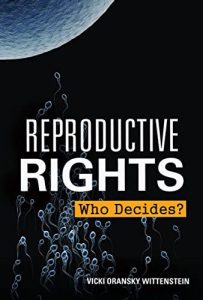
Throughout history, men and women have always found ways to control reproduction. In some ancient societies, people turned to herbs or traditional rituals. Others turned to methods that are still used in the twenty-first century, such as abstinence, condoms, and abortions.
Legislating access to birth control, sex education, and abortion is also not new. In 1873 the US Congress made it illegal to mail “obscene, lewd, or lascivious materials”—including any object designed for contraception or to induce abortion. In some states in the 1900s, it was illegal for Americans to possess, sell, advertise, or even speak about methods of controlling pregnancy.
At the beginning of the twentieth century, Margaret Sanger, Mary Ware Dennett, and others began to defy these laws and advocate for the legalization of birth control and for better women’s reproductive healthcare. By 1960 doctors had developed the Pill, but it wasn’t until 1972 that all US citizens had legal access to birth control. And in the landmark decision Roe v Wade (1973), the US Supreme Court ruled that women had a constitutional right to terminate a pregnancy.
Disputes over contraception, sex education, and abortion continue to roil the nation, leading to controversial legal and political rulings and occasionally violence. As society changes—and as new reproductive technologies expand the possibilities for controlling and initiating pregnancy—Americans will continue to debate reproductive rights for all.
Graphic Novels
Comics for Choice: Illustrated Abortion Stories, History, and Politics Editors: Hazel Newlevant, Whit Taylor, Ø. K. Fox
Call Number: GN C7351
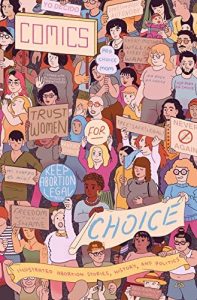 Comics for Choice is an anthology of comics about abortion. As this fundamental reproductive right continues to be stigmatized and jeopardized, over sixty artists and writers have created comics that boldly share their own experiences, and educate readers on the history of abortion, current political struggles, activism, and more. Lawyers, activists, medical professionals, historians, and abortion fund volunteers have teamed up with cartoonists and illustrators to share their knowledge in accessible comics form.
Comics for Choice is an anthology of comics about abortion. As this fundamental reproductive right continues to be stigmatized and jeopardized, over sixty artists and writers have created comics that boldly share their own experiences, and educate readers on the history of abortion, current political struggles, activism, and more. Lawyers, activists, medical professionals, historians, and abortion fund volunteers have teamed up with cartoonists and illustrators to share their knowledge in accessible comics form.
Not Funny Ha-Ha: A Handbook for Something Hard by Leah Hayes
Call Number: GN H327n
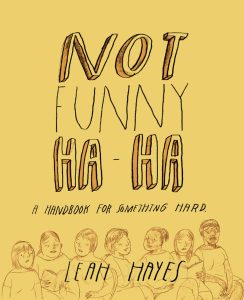
Not Funny Ha-Ha is a bold, slightly wry graphic novel illustrating the lives of two young women from different cultural, family, and financial backgrounds who go through two different abortions (medical and surgical). It does not address the events leading up to the pregnancy, or even the decision-making before choosing abortion as an option. It simply shows what happens when a woman goes through it, no questions asked. It follows them through the process of choosing a clinic, reaching out to friends, partners, and/or family … and eventually the procedure(s) itself. Despite the fact that so many women and girls have abortions every day, in every city, all around us … it can be a lonely experience. Not Funny Ha-Ha is a little bit technical, a little bit moving, and often funny, in a format uniquely suited to communicate. The book is meant to be a non-judgmental, comforting, even humorous look at what a woman can go through during an abortion. Although the subject matter is heavy, the illustrations are light. The author takes a step back from putting forth any personal opinion whatsoever, simply laying out the events and possible emotional repercussions that could, and often do, occur